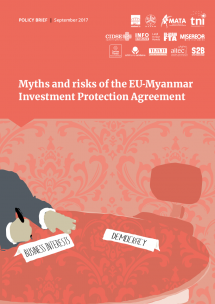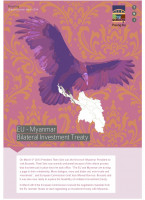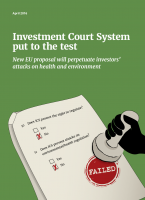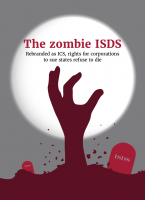Myths and risks of the EU-Myanmar Investment Protection Agreement
Regiones
As the signing of the EU-Myanmar Investment Protection Agreement (IPA) draws near, concerns over the secrecy surrounding the agreement’s negotiations and the risks it poses abound, alongside many myths about its potential benefits.

Descargas
Autores
Executive Summary
Myanmar is in the early days of democratization, with many laws and policies from the country’s military era in need of reform. Myanmar faces formidable challenges to build regulatory frameworks – not least in relation to the ownership and revenue sharing of natural resources in various ethnic areas, to the protection of human and labour rights and the environment.
The peace process to end the 68-year old civil war is slow, with military offensives by the national army against ethnic armed groups ongoing in Kachin and Shan States, resulting in abuses against civilians and massive displacement. Achieving a lasting peace will involve moving towards a more federal system for which many new policies and laws will have to be introduced.
This paper argues that the benefits of the IPA are highly overstated, and the risks seriously underestimated:
Myths
- It will bring high levels of European investment and help the country develop
- It will protect workers’ rights and the environment
- EU investors will help improve Myanmar’s human rights situation
- EU-Myanmar IPA negotiations are far more transparent than other treaties negotiated by Myanmar
- EU-Myanmar IPA will be just one of many treaties signed by Myanmar
Risks
- It will prevent democratic regulatory reform
- It will impact on a scarce public budget
- It will block the peace process
- It takes away the incentive to strengthen the national judicial system 5: It could be approved without any public scrutiny
The IPA could have major negative impacts on democratic development, human rights and sustainable peace in Myanmar, depriving it of the necessary policy space to harness investment to serve sustainable development and peace. It also has the potential to bankrupt the country through potential lawsuits led by foreign companies unwilling to see stronger regulations that may impact their profits.
Furthermore, there are serious human rights violations against Muslim communities in Rakhine State as well as peoples in other parts of the country. The EU has made the upholding of human rights an integral part of its external trade relations – so if negotiations continue with Myanmar under the current circumstances, this commitment is in question.
The IPA negotiations may be drawing to a close, but there is still time for a much-needed, wide-ranging public debate among parliamentarians and civil society to close the democratic gap opened up by the IPA negotiations. Parliamentarians in Europe and Myanmar have a key role to play in this debate. This briefing includes a series of recommendations that aim to strengthen the Parliamentarians’ role.
Published by Transnational Institute, Paung Ku, KESAN, Myanmar Alliance for Transparency and Accountability (MATA), Land in Our Hands (LIOH) network, The EU-ASEAN FTA campaign network, CIDSE, MISEREOR, Info Birmanie, Secours Catholique – Caritas France, CCFD-Terre Solidaire, Seattle to Brussels Network, Association Internationale de Techniciens, Experts et Chercheurs (AITEC), 11.11.11




